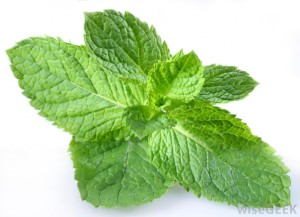Peppermint can be used as a flavoring for gum, tea, ice cream, cookies, toothpaste, and more. Mint can be used for flavor and a cool sensation, but can also be used for healing for medical related purposes. Sometimes, when one has a stomach ache they will be told to chew a piece of mint gum to calm their stomach. The question that is raised is “what are the the true healing purposes of peppermint?”
Some more basic purposes for peppermint can be used to help headaches, skin irritation, nausea, diarrhea, menstrual cramps, flatulence, and anxiety. Other purposes are indigestion, irritable bowl syndrome, or pain in the lower gut.
One option to ingest peppermint is for the purpose of improving IBS (irritable bowl syndrome). Aline Charabaty, MD is a director of the Center of Inflammatory Bowel Disease at Georgetown University Hospital in D.C recommends using coated capsules of peppermint oil. She explains that these capsules positively benefit the improvement of IBS symptoms by taking two capsules twice a day for at least four weeks. Peppermint is able to serve other various purposes besides just calming the stomach. Another example is helping symptoms of the cold and flu. Menthol is peppermint’s active agent is an effective decongestant. Menthol thins mucus and helps loosen phlegm and break up coughs. Additionally it helps sooth the throat and decrease dry coughs.In terms of skin irritation, peppermint has a soothing and cooling sensation when applied topically to calm skin irritation such as hives or poison ivy. Peppermint can serve a variety of purposes and can be utilized in different forms.
In a study on the effectiveness of peppermint researches tested weather coated peppermint oil would help IBS or recurrent abdominal pain in children. 651 patients were studied, and 9 of the 16 studies were double blind randomized control trials. Some were given peppermint oil and some were given a placebo. Eight of the twelve placebo-controlled trials showed statistically significant improvement from the patients who received the peppermint oil. 58% had improvements who used the peppermint oil and 28% had improvement who took the placebo. In conclusion, the researchers found that peppermint oil significantly improves IBS symptoms.
This study appropriately chose a double-blind so that the researcher and participants weren’t aware of who was being treated with the oil and who was being treated with the placebo. This avoids any researcher or participant bias that could create artificial results or a false positive or negative due to unauthentic feedback from either the researcher or participants. Also the study made the intelligent choice of using a placebo to test to see if the oil produces significant effects. One flaw with this study is that it only tests children. I would be interested in seeing if similar or different results happen when this study is done on adults. Those results may alter the way we evaluate the healing potential of peppermint. Although it is said that peppermint has various abilities to help medical illnesses, there are still many questions about how significant its effects are.


I have always chosen to chew peppermint gum, but I did not know it had so many healing powers. Your data is very strong and convincing for improving the health of the participants. However, it would be interesting to see if the effects of peppermint are long lasting or just for immediate pain relief. It would also be interesting to see if the benefits are similar in people without IBS and with IBS. This would require a longitudinal study of IBS patients (experimental group) and of patients without IBS(control group). I am surprised not more doctors prescribe peppermint since the data shows that it has been effective in studies.